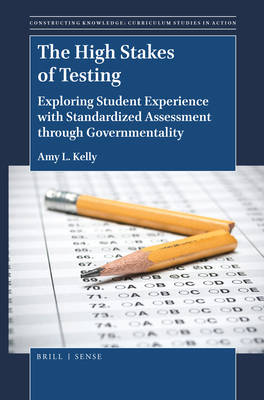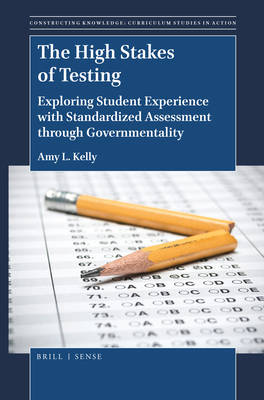
- Afhalen na 1 uur in een winkel met voorraad
- Gratis thuislevering in België vanaf € 30
- Ruim aanbod met 7 miljoen producten
- Afhalen na 1 uur in een winkel met voorraad
- Gratis thuislevering in België vanaf € 30
- Ruim aanbod met 7 miljoen producten
Zoeken
The High Stakes of Testing
Exploring Student Experience with Standardized Assessment Through Governmentality
Amy L Kelly
€ 209,45
+ 418 punten
Uitvoering
Omschrijving
Standardized assessments have long been part of the educative experience for students around the world. The high-stakes nature of these tests can have damaging and enduring effects for public school systems, particularly the youth. With the adoption of Common Core State Standards and mandated state-wide accountability measures, high-stakes tests, like the PARCC, gained quick and controversial notoriety.
The high-stakes discourse has been dominated by politicians, educators, and parents. Notably absent from this dialogue are the voices of those whom are impacted the most: students. Largely influenced by Critical Pedagogy, this research sheds light on the negative, punitive, and often arbitrary nature of testing in schools. The paramount intention of this publication is to raise awareness of student experiences and perspectives of standardized testing.
The High Stakes of Testing analyzes the experiences, relationships, thoughts, ideas, and opinions students have with standardized assessment measures. Interviews with seven students in Grades 3, 5, and 8 are examined through a governmentality lens to reveal the ways in which the youth are manipulated, regulated, and disciplined to view standardized testing as a natural part of what it means to be a public-school student. It is only when we can begin to see and appreciate how our youth interact with the omnipresent testing in our public schools can we begin to envision changing these accountability practices.
The high-stakes discourse has been dominated by politicians, educators, and parents. Notably absent from this dialogue are the voices of those whom are impacted the most: students. Largely influenced by Critical Pedagogy, this research sheds light on the negative, punitive, and often arbitrary nature of testing in schools. The paramount intention of this publication is to raise awareness of student experiences and perspectives of standardized testing.
The High Stakes of Testing analyzes the experiences, relationships, thoughts, ideas, and opinions students have with standardized assessment measures. Interviews with seven students in Grades 3, 5, and 8 are examined through a governmentality lens to reveal the ways in which the youth are manipulated, regulated, and disciplined to view standardized testing as a natural part of what it means to be a public-school student. It is only when we can begin to see and appreciate how our youth interact with the omnipresent testing in our public schools can we begin to envision changing these accountability practices.
Specificaties
Betrokkenen
- Auteur(s):
- Uitgeverij:
Inhoud
- Aantal bladzijden:
- 142
- Taal:
- Engels
- Reeks:
- Reeksnummer:
- nr. 19
Eigenschappen
- Productcode (EAN):
- 9789004387232
- Verschijningsdatum:
- 9/05/2019
- Uitvoering:
- Hardcover
- Formaat:
- Genaaid
- Afmetingen:
- 155 mm x 236 mm
- Gewicht:
- 385 g

Alleen bij Standaard Boekhandel
+ 418 punten op je klantenkaart van Standaard Boekhandel
Beoordelingen
We publiceren alleen reviews die voldoen aan de voorwaarden voor reviews. Bekijk onze voorwaarden voor reviews.











